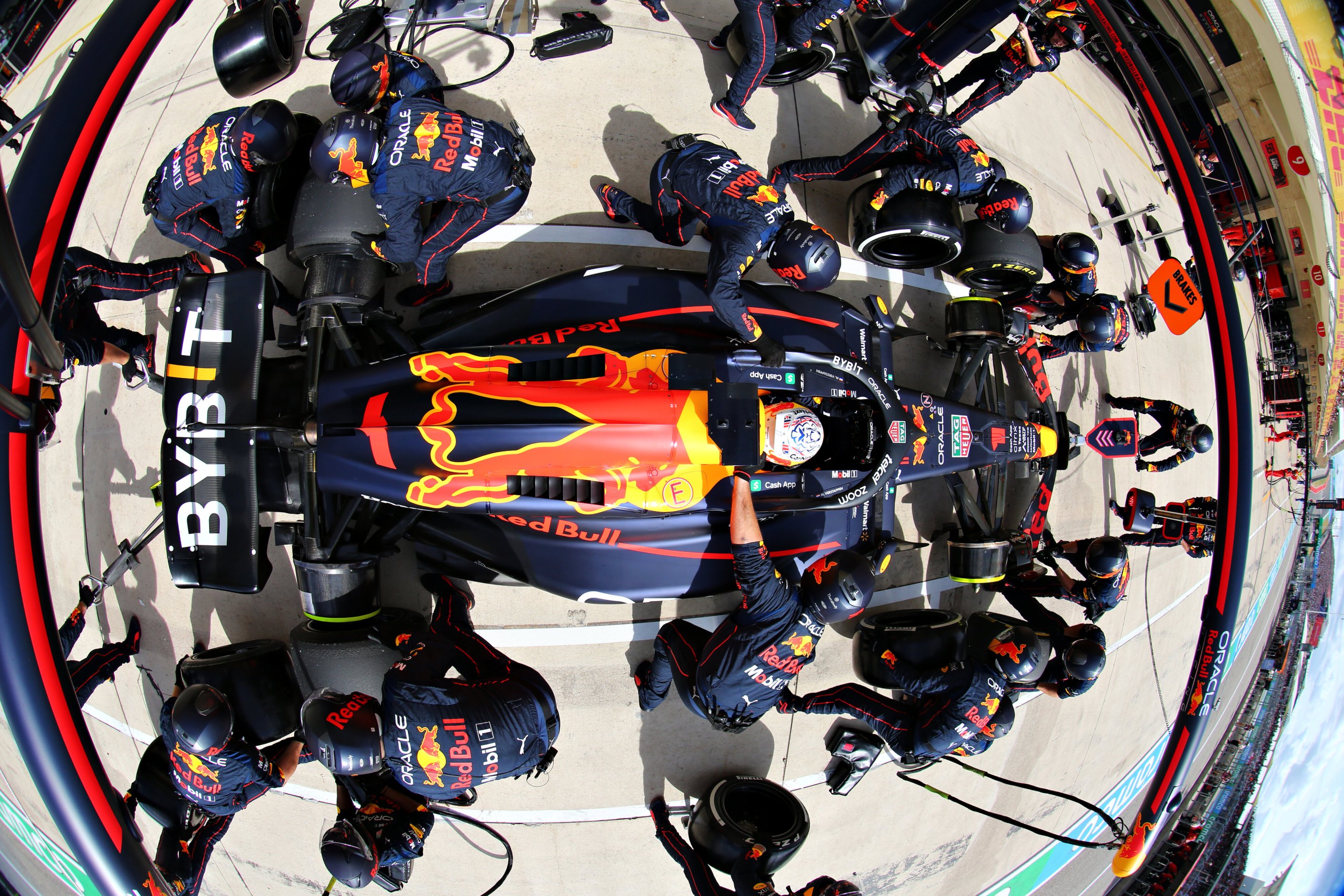If the United States GP had actually taken place—and who can really say if it did—it didn't matter very much. Even if, hypothetically speaking, Red Bull Racing had clinched the Constructor's Championship or Max Verstappen had tied Sebastian Vettel and Michael Schumacher in single-season race wins, the United States GP would've merely been window-dressing. It was only a matter of time after Ferrari came out of the summer break looking no faster than before. You know how the saying goes: If a race takes place in Austin, complete with Daniel Ricciardo cosplaying as a cowboy, but everything unfolds exactly as anticipated, did it even happen at all?
OK, fine, there was some action at the top. George Russell punted Carlos Sainz Jr. out of the race on the very first lap, though Sainz, who had started on pole, had already lost his place to Verstappen by then. Sebastian Vettel even led the race, and for three beautiful laps, there was joy!—until a botched pitstop. And, of course, just before that, after 36 torturously boring laps with Verstappen comfortably in the lead, Red Bull made the rare pitstop error, taking 11 seconds to switch Verstappen onto a new set of medium tires, and Verstappen fell behind both Lewis Hamilton and Charles Leclerc.
The pitstop error seemed very much the surprise that the season needed, now that the races no longer mattered very much for those at the top. There have only been four race winners this season: Verstappen with 13, and then the Ferraris and Sergio Pérez splitting the remaining six. Notably absent is Mercedes, and in particular, Lewis Hamilton, who at this point in the race, found that the somewhat fuck it, we ball gamble of switching onto the hard tires to force Red Bull's hand actually worked, and suddenly he was in the lead—at least after overtaking a yet-to-pit Vettel who, again, somehow ended up in the lead.
To an extent, the lack of diversity in race wins this season is unsurprising. Without consistent competition, which neither Ferrari nor Mercedes supplied, or mistakes, which Red Bull was too competent to make, a Red Bull car would be there for the win even if the remaining spots of the podium were up for surprises. But you have to go back to 2016—teenaged hot-head Verstappen's debut and first-ever win—to the last time there were only four race winners in a season. Even in The Age of the W11 (or 2020, as it is more commonly known), we saw Pierre Gasly and Sergio Pérez get their first-ever wins; in 2021, interspersed between the Verstappen-Hamilton showdown, there was Esteban Ocon and Daniel Ricciardo.
So perhaps we have just been spoiled of late after the previous few seasons, sitting here on our silly little hands and waiting for F1 to deliver a surprise, the standards of which have now been set so low that seven-time champ Lewis Hamilton winning a race would qualify. And sure, why not! Who doesn't want to believe that in a world that is tended towards higher entropy and always contains stuff like runaway championship favorites or work or problem sets or computer systems midterms can, in fact, lend itself to miracles? That's what sports are for!
But I've already spoiled the result: Verstappen won anyway. Hamilton held out for a good length of time, but the Mercedes was a sitting duck on the straights, and after Verstappen, on the faster medium tires, in the faster car, got within DRS range of Hamilton, it was as good as decided. Hamilton would just have to wait for the next race. Anticlimactic, sure, but that's only natural. Verstappen is a great driver in a great car in a great team that doesn't seem to be struggling with any sort of internal dysfunction, despite Helmut Marko and, uh, the whole cost cap thing going on, though there aren't about to be any major sanctions looming on the horizon for that.
This is all to say that despite all the grousing, in a year or five or 20 or, certainly, whenever Verstappen will retire, the United States GP will start to matter. Only in retrospect, when you begin to tally up the points, does consistency become compelling: 13 race wins in the first 19 races, an unbeatable car, the dominant 2022 that was all too necessary to wash down a hotly debated 2021. It may not be entertaining now, but that just comes with the territory. Dominance, at least in the moment, is boring.
For those holding out for a surprise, there's still three races left for, well, anything to happen. Theoretically. If the Red Bull is off the pace. Hamilton is still looking to preserve his streak of winning in every single F1 season he's raced so far, and boy will you be hearing a lot about that until Abu Dhabi. Maybe Nicholas Latifi will get a podium place! You never know!
Of course, all of this is said assuming that the United States GP had actually taken place, which is still yet to be determined. Let's wait a few more years, or maybe until a surprise actually happens, before we get too hasty with calling it.





